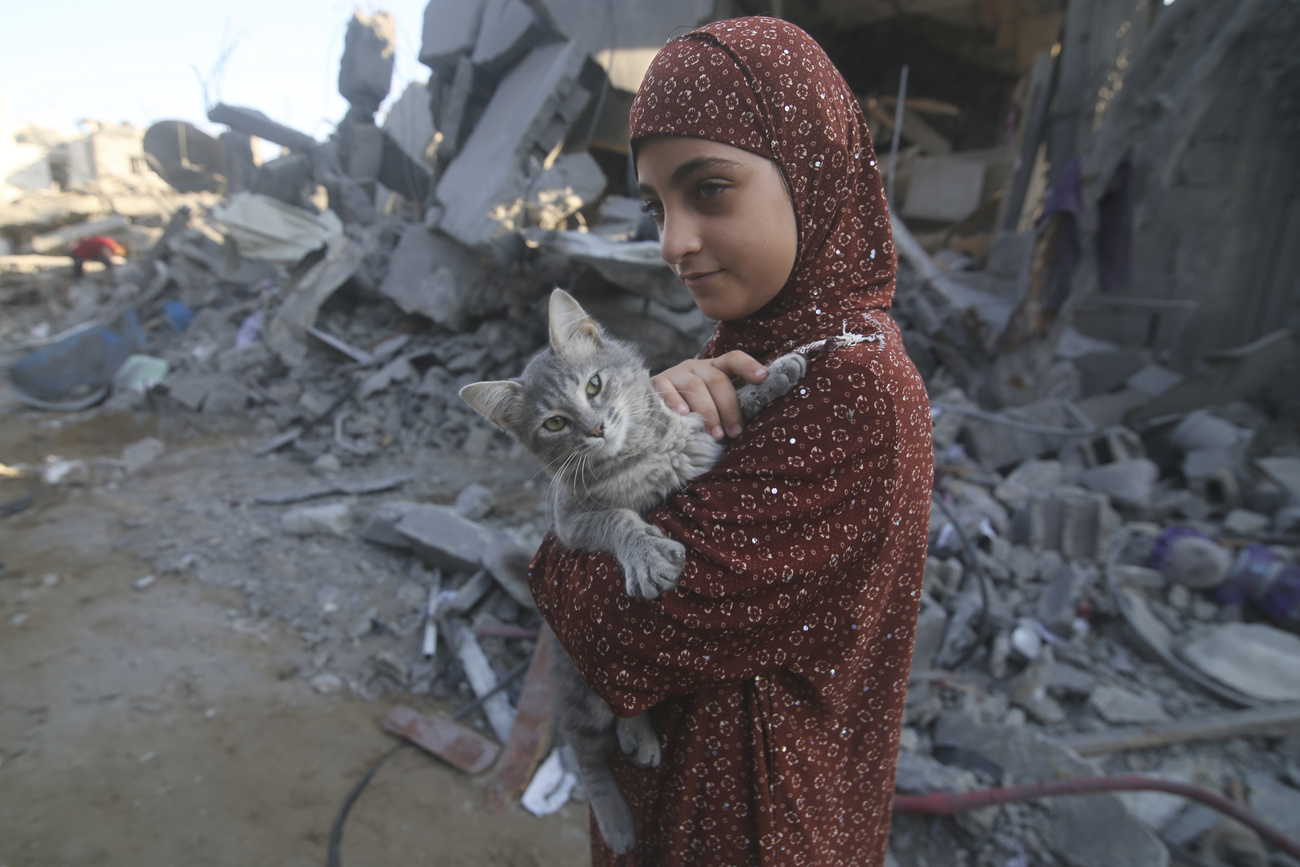
‘I respect Switzerland’s autonomy, yet the abstention leaves me deeply saddened’

Switzerland's recent abstention from a Russian-led resolution on Gaza's ceasefire sparks consternation among Palestinians in Switzerland. The Swiss representation at the United Nations (UN) Security Council explains the decision.
On Monday, the UN Security Council did not pass a Russian-proposed resolution seeking a humanitarian ceasefire in Gaza. Notably, the draft excluded any reference to Hamas. The Russian-led initiative secured support from five countries: China, Gabon, Mozambique, Russia, and the United Arab Emirates. However, it faced opposition from France, Japan, the UK, and the US, while Albania, Brazil, Ecuador, Ghana, Malta, and Switzerland abstained.
The Alpine country’s abstention triggers a whirlwind of emotions for 36-year-old Palestinian Eman, who hails from Gaza. Having found refuge in Switzerland, Eman (full name known to SWI swissinfo.ch) appreciates the freedoms she’s been afforded, including participating in peaceful marches in Geneva that champion the Palestinian cause. However, juxtaposed with this gratitude is a lingering sorrow. “I respect Switzerland’s autonomy in decision-making. Yet, the abstention leaves me deeply saddened,” she tells SWI.
“We yearn for peace”
Eman’s personal history intertwines with the broader narrative of the conflict. Originally from Shujaiya, one of the most densely populated areas of the Gaza Strip, she lived through the traumatic events of the 2014 Gaza WarExternal link. That year, her son sustained injuries, and she endured an agonising period thinking she’d lost three of her children, only to be later reunited, thanks to the timely intervention of the Red Cross.
By 2015, Eman and her family had relocated to Switzerland. As she reminisces, one haunting memory stands out: “On my way to the safety of Switzerland, I had to walk over the bodies from the Shujaiya conflict.”
The ongoing Israeli-Palestinian war revives her anxieties. Her voice trembles as she recounts, “My cousin’s children are killed. I’m in the dark about my aunts and uncles. The last I knew, my mother and siblings took refuge in an UNRWA [United Nations Relief and Works Agency for Palestine Refugees] school, but now, their fate is uncertain.”
The ongoing strife takes its toll on her mental well-being. “I fear sleeping and waking up to devastating news,” she admits, adding, “Escaping physically is one thing; how do you mentally escape when such violence persists in your homeland?”
This sentiment echoes the cry of many: an end to the conflict. “We don’t seek aid or support. We yearn for peace,” Eman articulates.
The reason why Switzerland abstained
Amid these heart-rending personal narratives, Switzerland’s official stance attempts to shed light on the situation’s complexities. The Swiss representation at the UN Security Council elucidates the decision to abstain, stating in a document published in October 16External link, ” Switzerland shares the sense of urgency, the great concern and therefore the need for the Council to act united in the face of the situation in the Middle East. As the Secretary General has reminded us, de-escalation, the protection of civilians, the release of all hostages and the delivery of humanitarian aid are priorities.”
The resolution’s glaring omission of international humanitarian law was a crucial point of contention. Switzerland’s commitment to these principles is evident in their assertion: “For Switzerland, the omission of a clear reference to international humanitarian law in a Council resolution, when the situation constitutes an armed conflict, is simply not acceptable.”

Switzerland says yes to humanitarian pause. U.S. vetoes
During a Security Council meeting on Wednesday, a Brazilian-drafted resolution calling for humanitarian pauses in Gaza to allow complete, safe, and unhindered access for United Nations agencies and their partners was vetoed by the United States, preventing its adoption.
If adopted, “the resolution would have condemned all violence and hostilities against civilians and all acts of terrorism”. It also called for the immediate and unconditional release of all hostages and the protection of medical and humanitarian personnel, hospitals, and medical facilities, in line with international humanitarian law.
The draft gained support from 12 Council members. Switzerland voted, this time, in favour of the textExternal link. Pascale Christine Baeriswyl, Permanent Representative of Switzerland to the UN, emphasised the resolution project’s alignment with the Alpine country’s priorities for an immediate release of hostages and rapid humanitarian access. She expressed regret that the Council could not reach a consensus on the draft resolution.
The voting came one day after a devastating blast at Al-Ahli al-Arabi Hospital in the Gaza Strip that tragically killed hundreds of Palestinians, according to the Ministry of Health in Gaza. In response, Switzerland’s foreign ministry condemned the act, emphasising the importance of protecting civilians and hospitals under international humanitarian law. While Palestinian officials attribute this grievous incident to an Israeli airstrike, labelling it a “massacre,” Israel points to the Palestinian Islamic Jihad group, suggesting a failed rocket launch on their part. The group, however, refutes these claims.
Israel has subjected Gaza to a strict blockade and has implemented its heaviest airstrikes. Press agency Reuters reports that following the October 7 attack by Hamas on Israel, which resulted in the death of 1,300 and around 200 hostages taken, Israel pledged to eliminate Hamas. The war has led to the killing of at least 3,000 Palestinians so far.

In compliance with the JTI standards
More: SWI swissinfo.ch certified by the Journalism Trust Initiative
















![The four-metre-long painting "Sonntag der Bergbauern" [Sunday of the Mountain Farmers, 1923-24/26] had to be removed by a crane from the German Chancellery in Berlin for the exhibition in Bern.](https://www.swissinfo.ch/content/wp-content/uploads/sites/13/2025/12/01_Pressebild_KirchnerxKirchner.jpg?ver=cb688ed5)















You can find an overview of ongoing debates with our journalists here . Please join us!
If you want to start a conversation about a topic raised in this article or want to report factual errors, email us at english@swissinfo.ch.